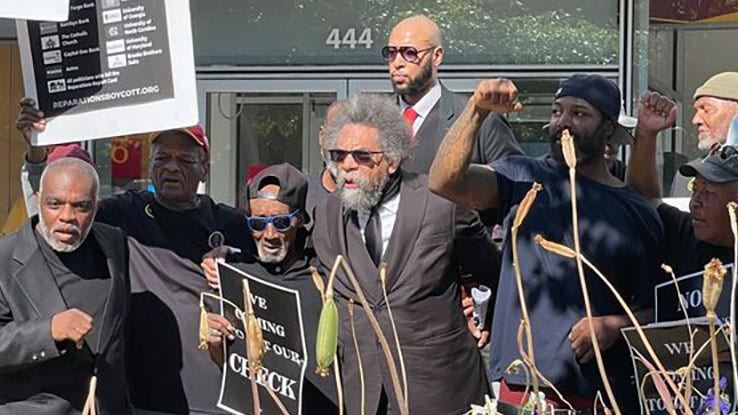Unaffiliated presidential candidate Cornel West recently joined protesters picketing in front of Wells Fargo Bank in Washington, D.C., to support their demands for reparations. West emphasized the importance of reparations in his lifelong pursuit of truth and justice, particularly in addressing the historical injustices of slavery. He pointed out the role that financial institutions like Wells Fargo played in benefiting from these injustices, including post-Jim Crow era injustices. West’s presence at the protest highlighted the pressure being put on institutions that profited from slavery, such as Wells Fargo, and he expressed solidarity with his fellow activists.
West, a renowned professor and intellectual, highlighted the history of Wells Fargo’s growth and acquisitions, including its takeover of Wachovia Bank in 2008. He mentioned that Wachovia’s predecessor institutions were found to have owned slaves, underscoring the bank’s connections to slavery. Activist Truth Bey, who joined the protest, spoke about the need to hold banks accountable for their involvement in chattel slavery and emphasized that African Americans are the only group that have not received reparations for past injustices. She compared the lack of reparations for African Americans to the compensation provided to other groups, such as Holocaust survivors in Germany and Japanese internment camp prisoners in the U.S.
The protest also brought attention to the ongoing impact of banks’ historical ties to slavery, with demonstrators holding signs demanding reparations and pointing out the parallels between past injustices and present-day issues. Eyewitnesses reported seeing someone waving a Black nationalist flag at the protest, indicating a diverse range of perspectives and motivations among the demonstrators. The Obama Justice Department previously reached a fair-lending settlement with Wells Fargo in 2012, highlighting the ongoing scrutiny of the bank’s practices and treatment of minority borrowers.
Overall, the protest at Wells Fargo Bank in Washington, D.C., underscored the ongoing calls for reparations for African Americans and the need to hold financial institutions accountable for their historical ties to slavery. Cornel West’s presence at the protest added a prominent voice to the demands for justice and highlighted the importance of addressing past injustices in order to move forward. The protesters’ focus on reparations and accountability for banks like Wells Fargo highlighted the intersection of economic, social, and racial justice issues that continue to shape discussions and activism in the United States.


